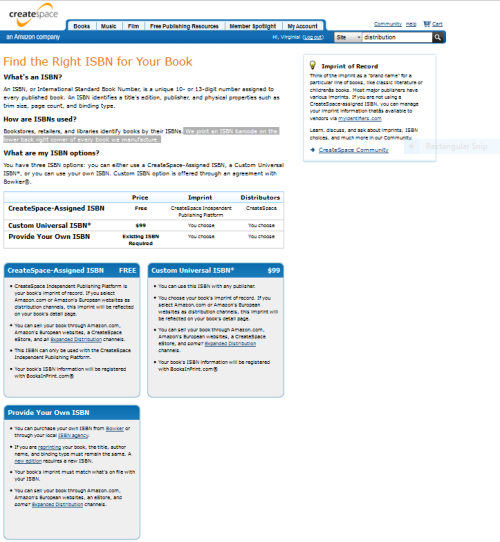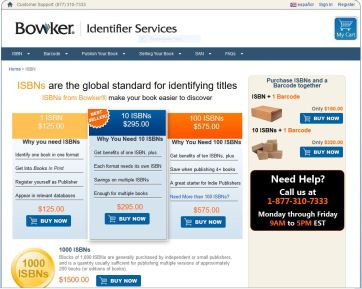
As I was finishing up my posts on how to format your own Print-on-Demand book interior using InDesign, I reached the point where I found myself writing about copyright pages and ISBNs. I wrote confidently, “You must have an ISBN.” In a recent post, I recounted my own experience buying an ISBN for my paperback copy of King of the Roses and my upcoming publication of a POD version of Blood Lies.
But a query from a reader triggered research that suggested that my advice might be a little too simplistic. I found arguments that seemed to undercut that that screaming need for an ISBN.
Those posts inspired me to look a little more carefully into the question. In this post, I’ll explain what I’ve gathered from searching out a range of opinions.
My research suggests that if you were publishing only digitally, as of this writing, you WON’T need an ISBN, and, for reasons I’ll discuss below, shouldn’t accept a free one from Amazon or any other venue where you’ve uploaded your ebook.
But my Beginner’s Cheat Sheet series for formatting your book interior assumes you have already decided that, for your own reasons, you want a paperback, Print-on-Demand, version of your book.
So what seems to be the consensus on ISBNs and Print-on-Demand editions?
 As a start, I learned that many countries, like Canada, provide free ISBNs and that authors in the U.K. go through a company called Nielsen. I’ve learned that ISBNs are considered international identifiers; the question isn’t about where an author writes, but rather, whether an author decides to participate in this national-identification system. In other words, the question of whether you need or want an ISBN doesn’t depend on which country you live in.
As a start, I learned that many countries, like Canada, provide free ISBNs and that authors in the U.K. go through a company called Nielsen. I’ve learned that ISBNs are considered international identifiers; the question isn’t about where an author writes, but rather, whether an author decides to participate in this national-identification system. In other words, the question of whether you need or want an ISBN doesn’t depend on which country you live in.
That said, all the evidence suggests that on the whole, if you’re publishing in paperback format, you will want to buy an ISBN.
BASICS: At Least It’s Hard to Get This Wrong
Wikipedia provides a useful definition of an ISBN, or “International Standard Book Number.” As the site says, if you are going to purchase ISBNs, each different edition of your book, except for reprints, MUST have a unique number. So if you have published an ebook and have an ISBN either because you’ve purchased one or because you accepted a free one from, say, Smashwords, you must acquire a new ISBN for your print edition.
Depending on the choices you make, your ISBN may be the single biggest expense you incur in the process of self-publishing if you edit and format your own book.
Wait! Why should an ISBN be an expense? Can’t you get one for free?
Well, yes.
You can if you choose Option One:
- You hire a book-publishing/packaging service that takes over some of the tasks of getting your book out into the market.
- For a fee—usually several hundred dollars—the service will develop your cover and the necessary metadata—that is, the description of your book that will appear in catalogues.
- You format your book according to the service’s guidelines and upload it.
- The service may provide marketing. You will have a chance to accept a free ISBN.
Note that CreateSpace and Ingram, which I discuss below, are both basically book-packaging services, except that you pay either very little in the case of Ingram, or nothing, in the case of CreateSpace. You do all the work, and in CreateSpace, you can opt to receive a free ISBN.*
But whether you accept the ISBN that comes with your package from a paid publishing service or that CreateSpace or Smashwords supplies for free, there seems to be a catch. Maybe several catches:
Multiple sources tell me that free ISBNs belong to the publishing service—CreateSpace or Lulu or whichever one you choose—not you—and the publishing service—not you—becomes the “publisher.” So Amazon, the owner of CreateSpace, is the publisher of your CreateSpace book if you accept their ISBN.
This means:
- You cannot take this ISBN to a new publisher or issue the book in your own imprint. If you want to publish elsewhere to take advantage of a wider range of distribution than Amazon provides, you will need a new ISBN—and there will be two or more different numbers for the same book, which can be confusing to your readers.
- Amazon and other publishing services that produce indie books have limited distribution options. At Amazon you must pay extra for your book to show up in non-Amazon catalogues.
- You may have limited control over the metadata of your book (the description that goes out to retailers, for example).
- If Amazon is your publisher because you have accepted their free ISBN, you may find that any brick-and-mortar stores that might consider carrying your book will resist ordering from Amazon:
- Amazon’s discount process disadvantages stores in comparison to other distributors.
- Amazon does not allow returns.
- Some booksellers are prejudiced against Amazon, believing that it has damaged their business.
To compound these problems, the quality of service you will receive at sites where an ISBN is included varies. CreateSpace does not market your book for you, and paid services may or may not provide reliable marketing. Paid services are often dinged for failing to fully reveal costs to the authors and for failing to fulfill contractual obligations. So choosing this option obligates you to do extensive due diligence. Explore services’ plans, read reviews, and check out the services’ reputations on watchdog sites like Preditors and Editors and Writer Beware. (Or course, such diligence is wise when dealing with any book packager whether or not you provide your own ISBN.)
Option One Twist: At one time, at Amazon, you could pay $10 so that your publishing name, or imprint, appeared as the publisher of your book. However, according to my research, Amazon no longer offers this option. Instead, you will pay $99 for a “Custom-Universal” ISBN. This expense allows you more distribution choices, but retailers will still see that your book is being distributed by Amazon, with all the problems that news may cause.
CreateSpace seems to require an ISBN “We print an ISBN barcode on the lower back right corner of every book we manufacture.”
To clarify for myself, I hunted around the CreateSpace site until I found Amazon’s own description of its handling of ISBNs and “imprints“—the name of the publisher that will appear in the metadata (your book’s “detail page”):
What’s not clear from these descriptions, to the amateur eye at least, is that when you choose Option Two, buying your own ISBN (below), you can publish anywhere you like and choose any distribution channel you like, which you cannot do if accept the free ISBN.
Moreover, if you choose Option Two, buying your own, you can buy it for about $25 as opposed to $99, though this process comes with its own catch.
Option Two:
You be the publisher.
You can do so by buying your own ISBN and either publishing exclusively with Ingram Spark or—and this seems to be the most recommended choice—publishing with BOTH Ingram Spark AND CreateSpace—again using your own ISBN.
My research suggests these advantages in publishing through Ingram, whether or not you also publish with CreateSpace:
- Ingram has the widest distribution list. In fact, Amazon will distribute your book through Ingram if you publish with CreateSpace.
- A book published through IngramSpark using your own ISBN will name you as the publisher and you will control your own metadata.
- Publishing with both, buying your ISBN first, gives you the best of both worlds:
- You’ll own and control your own book and data;
- If bookstores do want to order your book they’ll be glad to do so through Ingram;
- At the same time, you’ll also have the Amazon exposure that is most likely to result in sales.
Many if not most of the experts on self-publishing whose opinions I’ve monitored believe that these reasons alone justify paying for your own ISBN.
The catch to this option is that, yes, buying your own ISBN is relatively expensive. One will cost you (at this writing) $125. Most of the experts I’ve researched are clear that you’d be pound-foolish to buy just one. You can buy 10 for around $250, or $25 each.
Yes, that’s still an outlay.
But purchasing ten ISBNs will cost you less, possibly much less, than paying a book-publishing/packaging service. And you can’t produce your book for free with your own name or imprint as publisher at CreateSpace unless you already have that ISBN in hand.
Is there a reason why you might NOT want to spend money on your own ISBNs? Here’s an informative article from ALLi, the Alliance of Independent Authors, on this topic. The site lists reasons to buy and not to buy. Briefly,
You will want an ISBN if
- You harbor any dreams of ever selling your paperback in brick-and-mortar stores or, for that matter, selling through them. They rely on ISBNs for inventory and tracking.
- You ever imagine your book showing up as an actual pick-up-and-read-me book on library shelves.
- You want to publish at Ingram and take advantage of their superior distribution options.
- You plan on publishing a lot of books, or making a career out of publishing your own or others’ books. If so, you’ll be playing in large, international markets, many of which rely on ISBNs, so that not having one will create confusion.
Here are a couple of more subjective reasons for wanting your own ISBNs.
- An ISBN is a good way to point your friends and other potential buyers to all the different places where they can find your book.
- Having ISBNs on your books makes you, and the books, look “professional.” When someone picks your book up in the store, it will “look” like the traditionally published books alongside.
You may not want an ISBN if
- You plan on giving away your copies to family and friends.
- You plan on doing all your own selling, say, at book fairs.
- You don’t care if Amazon is the publisher of record of your book and their identifying number is the only number that will point to your book.
Bottom line:
Research carefully before deciding to opt out of the ISBN process or to accept a free ISBN. Make sure you know who will be the “publisher” of your book and what that means in terms of how it is handled and distributed. Be sure you won’t benefit from the international tracking services that having an ISBN provides. If you choose a book-packaging service other than Ingram or CreateSpace, make sure you fully understand the fee structure of what can turn out to be “vanity presses,” and make sure to compare these costs with those you’ll pay if you publish through Ingram and buy your own ISBN.
*Note that both Amazon and Ingram are offering new publishing services both for digital products and print versions of books. Discussion and evaluation of those ever-changing services is beyond the scope of this post, but I hope readers will chime in if they’ve had experiences with these services.
Please share your views and experiences! Have you published ebooks without ISBNs? Have you published Print-on-Demand books without them? Do you advise indie authors to buy or not to buy? Why or why not?








Pingback: Do you know if you need one yet? – jean's writing
Thanks, Jean!
LikeLike
Excellent post I have been thinking about this a lot recently as I have started uploading my manuscript to Createspace. After your advice I will probably opt for buying 10 ISBN’s.
LikeLiked by 1 person
Good luck with your upload. Ingram is not as “friendly,” but not impossible. Then you have the best of both worlds.
LikeLiked by 1 person
Going with createspace to begin with but may have a go at Ingram when I’m more confident!
LikeLiked by 1 person
Sounds good! 🙂
LikeLike
Reblogged this on K Y R O S M A G I C A and commented:
Excellent post about ISBN’s, the free or paid versions via Just Can’t Help.Writing
LikeLiked by 1 person
Thanks for the reblog!
LikeLiked by 1 person
Great info! So many details involved with ISBNs. I too bought a 10 bundle, the best way to go.
LikeLiked by 1 person
Thanks for commenting, Jean. They’re actually going faster than I thought. . . .
LikeLiked by 1 person
Pingback: Lazy Sunday #40 | Paula Acton
Thanks for the shout-out!
LikeLike
I bought 10 ISBNs and can’t believe how fast I’m using them. Definitely don’t buy one at a time. I wouldn’t use a “free” one from from a vanity publisher or middleman (trying hard not to name names). They come with too many pitfalls.
LikeLiked by 2 people
I’m having the same experience! Almost wish I’d bought more. 🙂
LikeLike
Reblogged this on Jessica Bakkers and commented:
Great post by Virginia. Very helpful!
LikeLike
Thanks, Jessica! I hope others found sifting through this information as helpful as I did when I compiled it.
LikeLiked by 1 person
It’s such great info; will be a huge help to me!
LikeLike
🙂
LikeLike
Thanks so much for this article! I have asked around about this very question and have had so many different answers back. This greatly clarifies things for me. Thanks!
LikeLiked by 1 person
Hi! The process of summing it up helped clarify it for me. I’m glad you found it useful!
LikeLiked by 1 person
Reblogged this on poetry, photos and musings oh my! and commented:
Valuable information and yours for the reading.
LikeLiked by 1 person
Thanks for much for the reblog. I hope others find some of this useful. I found summing up what I’d learned a big help.
LikeLiked by 1 person
I’ve no doubt that many will find useful information and that is why I reblogged it. Thanks for sharing it.
LikeLike
🙂
LikeLiked by 1 person
Thanks for sharing this helpful advice. 🙂 — Suzanne
LikeLiked by 1 person
My pleasure, Suzanne. I’m glad it was helpful. There are many views out there on this topic, so summing them up for myself felt useful. Thanks for visiting!
LikeLiked by 1 person
I published my first collection of poetry and prose, “Dalliance” without an ISBN. However “Lost in the Labyrinth of My Mind” and my forthcoming book, “My Old Clock I Wind”, all have ISBN. I agree with you that the presence of an ISBN makes finding your books easier. Additionally it does, as you say look “more professional”. Again (as you rightly point out), if you just wish to give your book away to family and friends, there is little point (if any) in going to the trouble/expense of obtaining an ISBN. Kevin
LikeLiked by 1 person
Thanks, Kevin. That’s where I’ve come down. I like having that stack of ISBNs sitting there, whatever comes!
LikeLike
Reblogged this on Chris The Story Reading Ape's Blog.
LikeLiked by 1 person